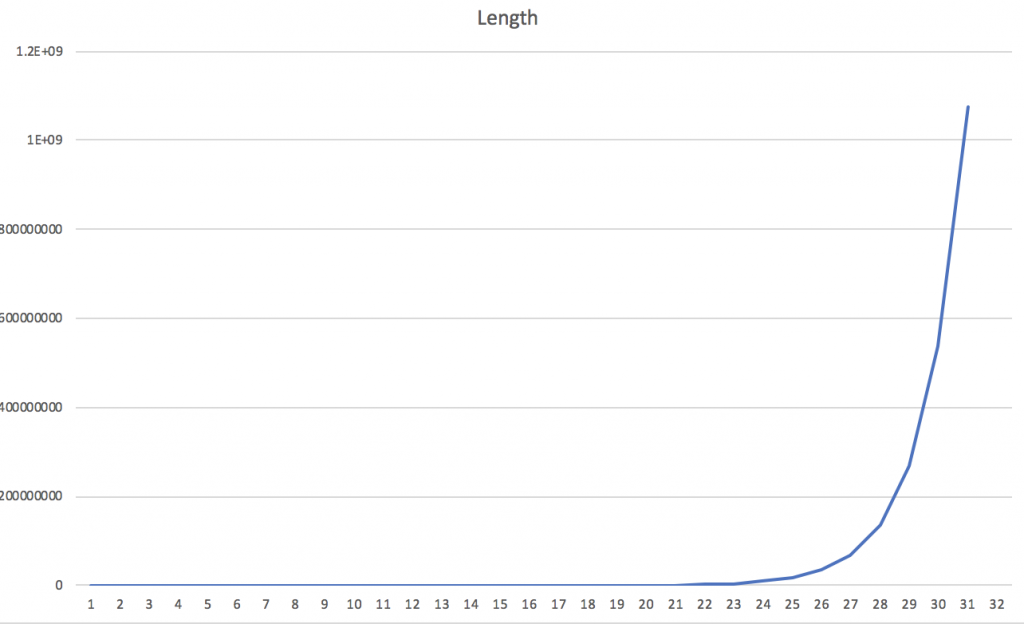The second task of this week’s challenge is to generate the Nth element in the sequence that is defined via a recurrent formula, which I will directly express in Raku:
multi sub S(0) {''}
multi sub S(1) {'0'}
multi sub S($n) {
my $prev = S($n - 1);
$prev ~ '0' ~ $prev.flip.trans('01' => '10')
}
At first, you may think it is a perfect match for Raku’s multi-functions, and it really is unless you read the next requirement from the task: Generate S1000. That is a bit too optimistic 🙂 (Update: it is asked to generate S30 now.)
First, let us run the program for the first few generations:
say "S$_ = {S($_)}" for ^9;
The program prints the following lines in just a fraction of a second:
$ time raku ch-2.raku S0 = S1 = 0 S2 = 001 S3 = 0010011 S4 = 001001100011011 S5 = 0010011000110110001001110011011 S6 = 001001100011011000100111001101100010011000110111001001110011011 S7 = 0010011000110110001001110011011000100110001101110010011100110110001001100011011000100111001101110010011000110111001001110011011 S8 = 001001100011011000100111001101100010011000110111001001110011011000100110001101100010011100110111001001100011011100100111001101100010011000110110001001110011011000100110001101110010011100110111001001100011011000100111001101110010011000110111001001110011011 real 0m0.351s user 0m0.224s sys 0m0.068s
If you call S(1000), you will never get a result, and that’s not because Raku is not fast enough.
Here is the graph showing how the string grows in size depending on generation number:

It is an exponential growth of O(2N).
Nevertheless, we can try optimising the first program.
Let us analyse the algorithm once again by looking at the first elements of the sequence.
S2 = 001 S3 = 0010011 S4 = 001001100011011 S5 = 0010011000110110001001110011011
The already-generated part of the string never changes. The left part of the current string always repeats the previous one. So, there is no need to create new strings on each iteration. What we really need, is to append the new bits to the end of the string.
I would let you try real bit operations as homework but propose a simple proof-of-concept solution with native ints instead.
my @bits of int;
@bits.push(0);
for ^9 -> $n {
my $size = @bits.elems;
print "S{$n+2} = ";
@bits.push(0);
@bits.push(@bits[$size - $_] ?? 0 !! 1) for 1 .. $size;
.print for @bits;
''.say;
}
Compare the two programs for, say, N = 25 (remove any printing instructions to not spend time on output):
$ time ch-2.raku real 0m42.401s user 0m36.209s sys 0m5.744s $time ch-2-bits.raku real 0m11.561s user 0m11.296s sys 0m0.331s
No doubts the second program is faster.
But before wrapping up, let me re-write the program in C++ and use an std::vector<bool> to keep the result (that’s not that necessary, as we still are not able to generate S1000).
#include <iostream>
#include <vector>
using namespace std;
int main() {
vector<bool> bits;
bits.push_back(0);
for (int n = 0; n <= 9; n++) {
int size = bits.size();
bits.push_back(0);
cout << 'S' << (n + 2) << " = ";
for (int m = 1; m <= size; m++)
bits.push_back(!bits[size - m]);
for (auto x : bits) cout << x;
cout << endl;
}
}
(That’s always a pleasure to see how fast C++ programs are.)
Let me not post the value of S30 here as its length is about 1 GB (1,073,741,823 to be correct).
And that’s all for now. See you next Monday.
Update: read a continuation with another interesting solution that uses Raku’s sequences.
→ GitHub repository
→ Navigation to the Raku challenges post series
One thought on “Raku challenge Week 69, issue 2”